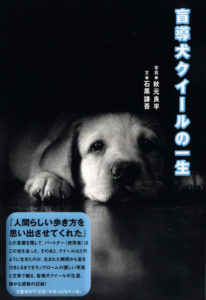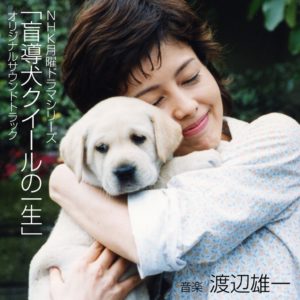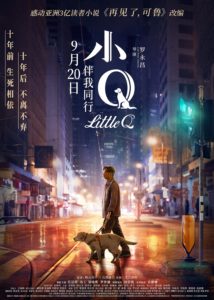Little Q
小Q
China, 2019, colour, 2.35:1, 106 mins.
Director: Luo Yongchang 罗永昌 [Law Wing-cheong].
Rating: 7/10.
Hong Kong’s Ren Dahua [Simon Yam] gives a career-defining performance as a bitter old blind man redeemed by a guide dog’s devotion.
Hong Kong, the present day. Along with his younger sister Li Bao’er (Liang Yongqi), Li Baoting (Ren Dahua), a celebrity pastry chef, visits some friends, veterinarians Lu Yong’an (Lin Wenlong) and his wife Liao Bishan (Yuan Shanshan), for cake and dinner. Li Baoting is bitter about his encroaching blindness; but during one argument he accidentally saves the life of a puppy from a litter of six yellow Labrador Retrievers that his friends have at home. The puppy, called Little Q, is donated to the Hong Kong Guide Dogs Association’s fostering programme, where it is put out to a family for 18 months before being assigned. The family’s daughter, Chen Zhiqiao (Liu Chutian), is very upset when Little Q is reclaimed, and begs her parents (Guo Jin’an, Yang Caini) to prevent it – but to no avail. Little Q is assigned to Li Baoting, who is now completely blind and more self-pitying than ever, drowning his sorrows in wine. He finally throws Little Q out in the rain, and association trainer Simon (Luo Zhongqian) tries everything to get Li Baoting to accept Little Q before the dog herself rejects him. The breakthrough comes after Little Q saves Li Baoting’s life when he tries to commit suicide in the street. Their bond is further enhanced when, on a visit to the Mainland to see his old cookery master (Lu Niu) in Guangzhou city, Little Q is almost stolen by dog thieves. Thanks to the bond between man and animal, Li Baoting regains his love of life and nature. But as Little Q reaches the age of eight, he shows signs of tiring easily. And then one day Li Baoting has a heart attack in the street.
REVIEW
As a blind old misanthrope who learns to embrace life again via the selfless love of a guide dog, Hong Kong veteran Ren Dahua 任达华 [Simon Yam] gives a career-defining performance in Little Q 小Q, which could so easily have been just a soppy tear-jerker with a cute animal. Proving yet again how Hong Kong actors tend to slowly grow into their craft (if they stay the course), Ren is equally convincing as a bitter, self-pitying man in the film’s first half and a reformed character in the second, generating genuine emotion rather than just ticking feel-good boxes. His performance is on a par with the equally fine one by fellow  Hong Kong veteran, Huang Qiusheng 黄秋生 [Anthony Wong], as a grumpy old wheelchair victim in Still Human 沦落人 (2018), and generating the same hard-won emotions. Despite a strong cast and quality production, the Mainland-funded but Hong Kong-set film managed only a polite RMB110 million in China.
Hong Kong veteran, Huang Qiusheng 黄秋生 [Anthony Wong], as a grumpy old wheelchair victim in Still Human 沦落人 (2018), and generating the same hard-won emotions. Despite a strong cast and quality production, the Mainland-funded but Hong Kong-set film managed only a polite RMB110 million in China.
If the story sounds familiar that’s because it’s based on the Japanese photo-novel The Life of Quill, the Seeing-Eye Dog 盲導犬クイールの一生 by photographer Akimoto Ryohei 秋元良平 and writer Ishiguro Kengo 石黑谦五 (see cover, left), which has already been made into a 2003 NHK TV drama (poster, below left) and a very popular 2004 film, Quill クイール (poster, bottom left), the latter by Korean-Japanese director Sai Yoichi 崔洋一. Little Q  adheres to the broad outline of the original – which was a fictional treatment of a real-life story – but makes many changes to incidental details: the main character is now a onetime celebrity pastry chef, not a journalist; he has a devoted younger sister, not a daughter and son; and he goes abroad to the US for surgery instead of staying at home. Most strikingly, this Chinese version amps up his anger in the early scenes, insulting everyone around him and (in a genuinely shocking moment) physically attacking his guide dog and throwing it out on the street.
adheres to the broad outline of the original – which was a fictional treatment of a real-life story – but makes many changes to incidental details: the main character is now a onetime celebrity pastry chef, not a journalist; he has a devoted younger sister, not a daughter and son; and he goes abroad to the US for surgery instead of staying at home. Most strikingly, this Chinese version amps up his anger in the early scenes, insulting everyone around him and (in a genuinely shocking moment) physically attacking his guide dog and throwing it out on the street.
 Other changes are less happy, including the subplot of a young girl whose family fosters the dog as a puppy and becomes distraught when it has to leave to go to work (the character is even reintroduced years later as a teenager). It’s perhaps understandable that the writers – five, count ’em, plus the experienced Chen Shuxian 陈淑贤 [Susan Chan] (A Simple Life 桃姐, 2011) as “script advisor” – thought the basic plot was too simple and needed more elaboration; but this subplot comes over as a distraction from the main event, as well as showing the mushy melodrama that Little Q might have become. Early scenes contain rather too much publicity for the Hong Kong Guide Dogs Association (set up in 2011), but the film is admirably restrained in endowing Little Q with any human qualities, getting by on natural canine emotions. Despite its good points, the film would still benefit from cutting by 10 minutes or so: the final section, though genuinely moving, goes on much too long, with nothing new brought to the table.
Other changes are less happy, including the subplot of a young girl whose family fosters the dog as a puppy and becomes distraught when it has to leave to go to work (the character is even reintroduced years later as a teenager). It’s perhaps understandable that the writers – five, count ’em, plus the experienced Chen Shuxian 陈淑贤 [Susan Chan] (A Simple Life 桃姐, 2011) as “script advisor” – thought the basic plot was too simple and needed more elaboration; but this subplot comes over as a distraction from the main event, as well as showing the mushy melodrama that Little Q might have become. Early scenes contain rather too much publicity for the Hong Kong Guide Dogs Association (set up in 2011), but the film is admirably restrained in endowing Little Q with any human qualities, getting by on natural canine emotions. Despite its good points, the film would still benefit from cutting by 10 minutes or so: the final section, though genuinely moving, goes on much too long, with nothing new brought to the table.
Ren, 64, who’s played good and bad characters throughout his career, anchors the production with a cleverly gauged performance, initially railing at the world (and the dog) in self-pity as he loses his sight and then gradually forming a relationship in which he can finally repay the animal’s devotion. Among the supporting cast, Liang Yongqi 梁咏琪 [Gigi Leung] is fine as his patient younger sister, Yang Caini 杨采妮 [Charlie Young] ditto as the young girl’s mother, and Luo Zhongqian 罗仲谦 okay as a so-nice-it-hurts dog-trainer. In a treat for film buffs, onetime Golden Harvest swordplay heartthrob Liu Yong 刘永, now 67, cameos as a bespectacled bar owner. But the movie is really Ren and the dog(s): nine yellow Labrador Retrievers were used to portray Little Q from puppyhood to old age, but 80% of the work was done by one dog, who gets second billing as Buding 布丁.
Technical credits by the Hong Kong crew are quality down the line, from the warm but un-gooey scoring by veteran Lu Guanting 卢冠廷 [Lowell Lo] to the sharp, bright widescreen photography by Chen Zhiying 陈志英 (Firestorm 风暴, 2013). In his best directorial outing since kidnap mystery Punished 报应 (2011), Luo Yongchang 罗永昌 [Law Wing-cheong], a onetime editor for Du Qifeng 杜琪峰 [Johnnie To], turns in a smooth product that shows no signs of the multiple takes needed with the canine cast. Editing, by Hong Kong-based David Richardson (also from the Du stable), is tops as usual.
For the record, the film’s end roller goes on for a painfully slow 10 minutes.
CREDITS
Presented by Filmko Film (CN). Produced by Filmko Film (CN).
Script: Bao Weicong, Ma Yongshi, Xu Yueming, Huang Junpei, Ruan Yunshan. Script advice: Chen Shuxian [Susan Chan]. Novel: Akimoto Ryohei, Ishiguro Kengo. Photography: Chen Zhiying. Editing: David Richardson, Zeng Yujian. Music: Lu Guanting [Lowell Lo]. Production design: Yu Jia’an [Bruce Yu]. Art direction: Li Qingyu. Costume design: Li Zhanyu. Sound: Du Duzhi, Jiang Yizhen. Visual effects: Xu Jian, Luo Weihao.
Cast: Ren Dahua [Simon Yam] (Li Baoting/Marcus), Liang Yongqi [Gigi Leung] (Li Bao’er), Luo Zhongqian (Simon), Yang Caini [Charlie Young] (Kang Yuan’er, Chen Zhiqiao’s mother), Yuan Shanshan (Liao Bishan/Jessica, vet), Liu Chutian (young Chen Zhiqiao), Yuan Lilin (teenage Chen Zhiqiao), Lin Wenlong (Lu Yong’an/Ryan, vet), Guo Jin’an (Chen Qi, Chen Zhiqiao’s father), Jia Xiaochen (Fiona), Yu Jianong (Yu, guide-dog association executive), Chen Yali (Cherry), Hu Ming (Qiang), Liu Yong (bar owner), Lu Niu (Li Baoting’s master), Deng Xiaoqiao (Li Baoting’s female apprentice), Liang Zhaofeng (Li Baoting’s male apprentice), Wu Chongming (King, Li Baoting’s apprentice/driver).
Release: China, 20 Sep 2019.
